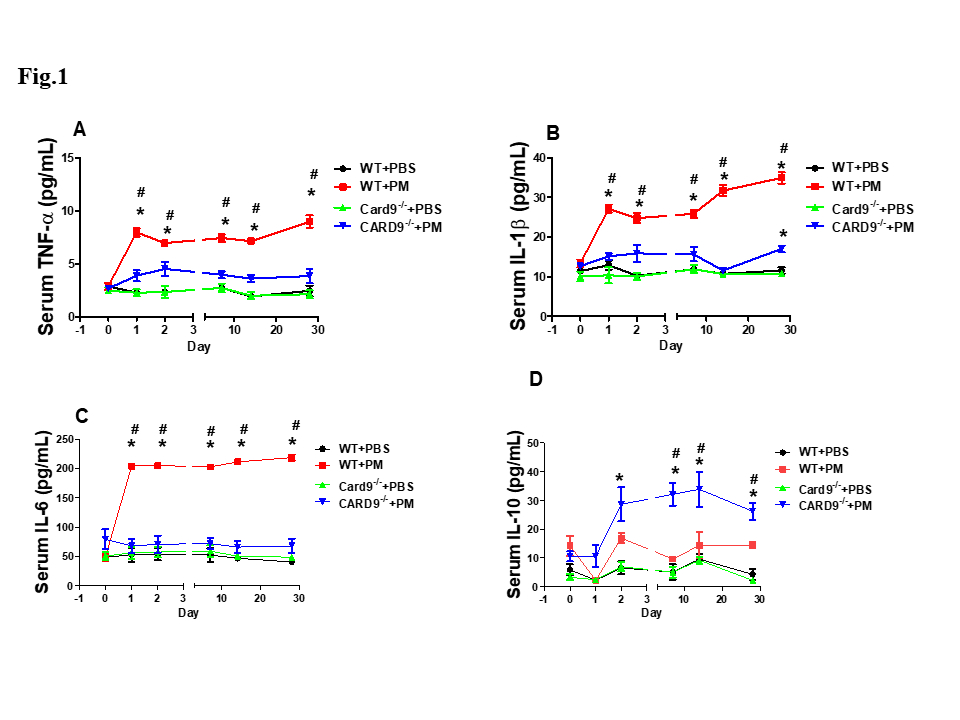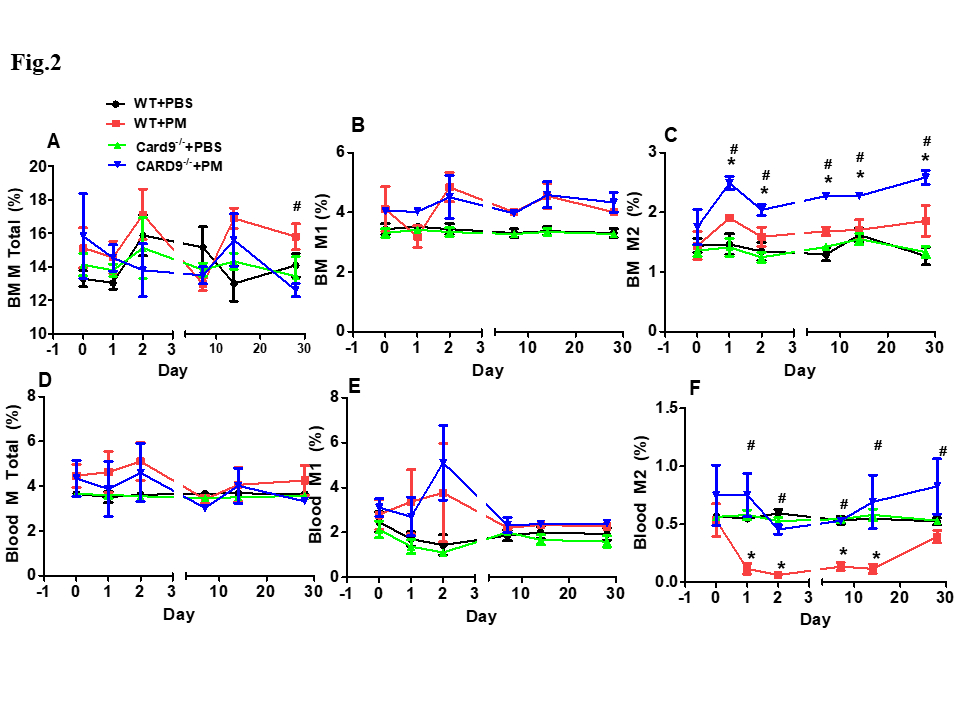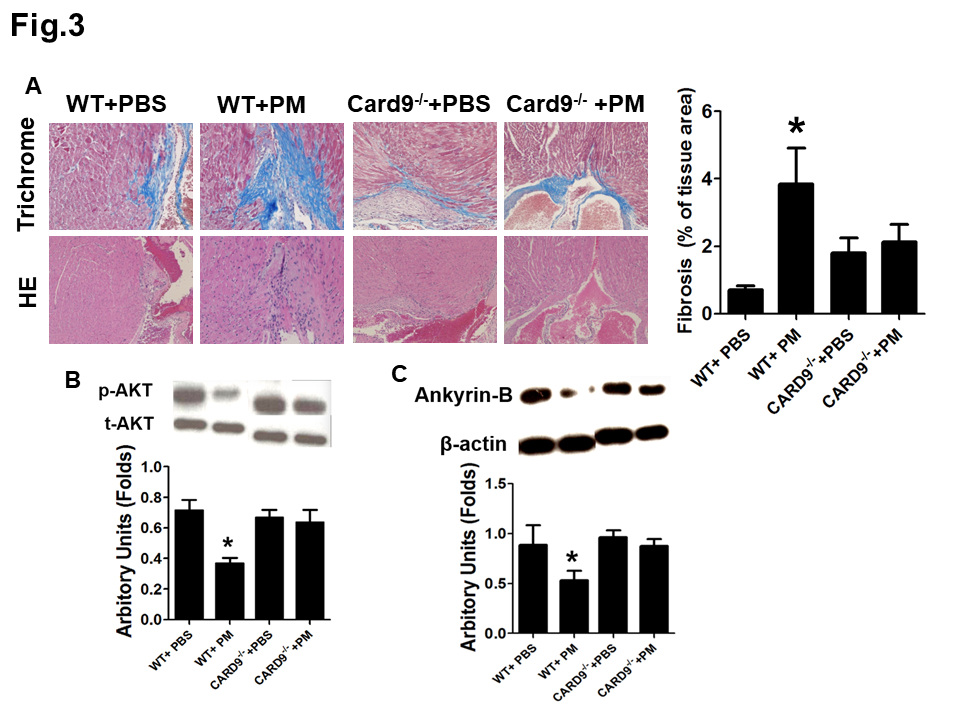Final ID: P2028
Air Pollution Induces Atrial Fibrosis via CARD9-Mediated Immune Response
Abstract Body: Background
Exposure to ambient fine particulate matter (PM) triggers systemic inflammation and is associated with atrial fibrosis (AF) and cardiac arrhythmia. The cytosolic adaptor caspase recruitment domain 9 (CARD9) is crucial for macrophage function and innate immune response. This study aimed to investigate the role of CARD9-dependent immune response in PM-induced macrophage-mediated inflammation and the detrimental effects of PM on the heart atrium, exploring the underlying mechanisms.
Methods
Male C57BL/6 wild type (WT) mice (4-6 months old, n=8-12) and age- and sex-matched CARD9 knockout (CARD9-/-) mice (n=8-12) were intranasally exposed to PM for 1, 2, 7, 14, and 28 days. Serum levels of TNF-α, IL-1β, IL-6, and IL-10 were measured using ELISA. Total macrophage populations and M1/M2 subpopulations in bone marrow (BM) and blood were analyzed in mice with and without PM exposure. BM macrophages were cultured for 48 hours in M0, M1, or M2 medium to analyze their populations and cytokine production with or without PM exposure. Phosphorylated Akt (p-Akt), p-Erk, and Ankyrin-B levels were determined in atrial cardiomyocytes using immunoblotting. AF area was measured with Masson’s trichrome staining.
Results
PM exposure significantly elevated serum levels of TNF-α, IL-1β, and IL-6 in WT mice within 24 hours, but not in CARD9-/- mice (Fig. 1). In CARD9-/- mice, PM exposure increased the M2 macrophage population and IL-10 levels compared to WT mice (Fig. 2), with similar findings observed in vitro using BM cells cultured in M0, M1, and M2 media. PM-induced AF was linked to reduced atrial p-Akt and Ankyrin-B levels, effects that were mitigated in CARD9-/- mice compared to WT mice (Fig.3).
Conclusion
PM exposure-induced AF may be linked to an enhanced macrophage inflammatory response through CARD9-mediated reduction in IL-10 secretion, resulting in a decreased M2 macrophage polarization from M0 macrophage. This study outlines the underlying mechanism of air pollution-induced atrial arrhythmia and explores potential prevention strategies and treatments.
Exposure to ambient fine particulate matter (PM) triggers systemic inflammation and is associated with atrial fibrosis (AF) and cardiac arrhythmia. The cytosolic adaptor caspase recruitment domain 9 (CARD9) is crucial for macrophage function and innate immune response. This study aimed to investigate the role of CARD9-dependent immune response in PM-induced macrophage-mediated inflammation and the detrimental effects of PM on the heart atrium, exploring the underlying mechanisms.
Methods
Male C57BL/6 wild type (WT) mice (4-6 months old, n=8-12) and age- and sex-matched CARD9 knockout (CARD9-/-) mice (n=8-12) were intranasally exposed to PM for 1, 2, 7, 14, and 28 days. Serum levels of TNF-α, IL-1β, IL-6, and IL-10 were measured using ELISA. Total macrophage populations and M1/M2 subpopulations in bone marrow (BM) and blood were analyzed in mice with and without PM exposure. BM macrophages were cultured for 48 hours in M0, M1, or M2 medium to analyze their populations and cytokine production with or without PM exposure. Phosphorylated Akt (p-Akt), p-Erk, and Ankyrin-B levels were determined in atrial cardiomyocytes using immunoblotting. AF area was measured with Masson’s trichrome staining.
Results
PM exposure significantly elevated serum levels of TNF-α, IL-1β, and IL-6 in WT mice within 24 hours, but not in CARD9-/- mice (Fig. 1). In CARD9-/- mice, PM exposure increased the M2 macrophage population and IL-10 levels compared to WT mice (Fig. 2), with similar findings observed in vitro using BM cells cultured in M0, M1, and M2 media. PM-induced AF was linked to reduced atrial p-Akt and Ankyrin-B levels, effects that were mitigated in CARD9-/- mice compared to WT mice (Fig.3).
Conclusion
PM exposure-induced AF may be linked to an enhanced macrophage inflammatory response through CARD9-mediated reduction in IL-10 secretion, resulting in a decreased M2 macrophage polarization from M0 macrophage. This study outlines the underlying mechanism of air pollution-induced atrial arrhythmia and explores potential prevention strategies and treatments.
More abstracts on this topic:
Air purification with portable air cleaners and its effect on blood pressure : An updated systematic review and meta-analysis of 21 studies.
Ramadan Shrouk, Elesawy Mahmoud, Abdelaziz Ahmed, Mohamed Ahmed, Elbenawi Hossam, Afify Raneem, Desouki Mariam, Elkhayat Ibrahim, Arafa Amr Ossama Gaber, Elnady Mohamed, Mohamed Elshafey Shams Mahmoud
Circulating Monocyte Gene Expression Profiles of Cardiac Remodeling and Incident Heart Failure: the Multi-Ethnic Study of AtherosclerosisPeterson Tess, Olson Nels, Durda Peter, Tracy Russell, Lima Joao Ac, Wu Katherine, Post Wendy, Liu Yongmei, Hahn Virginia, Rotter Jerome, Ambale-venkatesh Bharath, Varadarajan Vinithra, Lohman Kurt, Ding Jingzhong, Doyle Margaret



